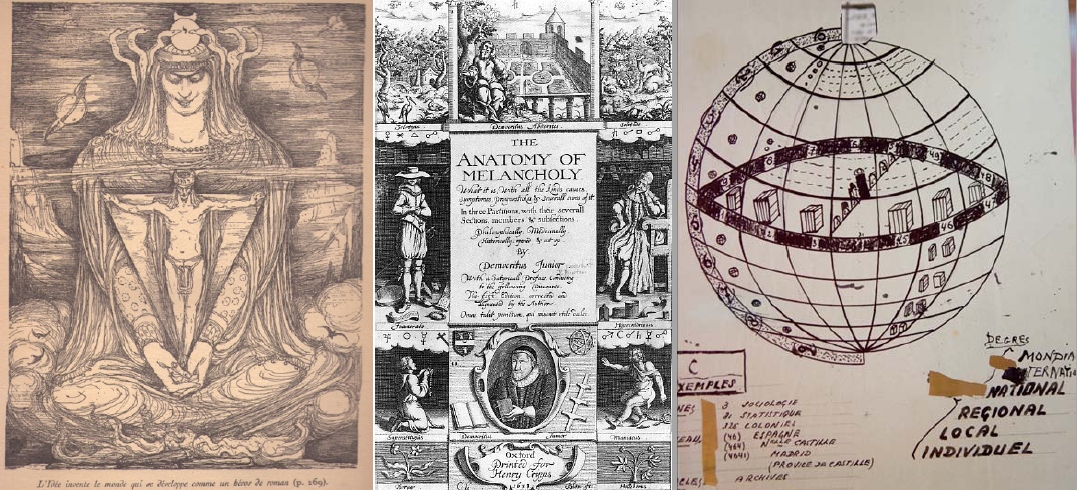Revisiting Melancholy
Robert Burton published the first edition of his magnum opus ‘The Anatomy of Melancholy’ in 1621. His aim was to write a definite and comprehensive study of the meaning of melancholy. His book promised to explain ‘.. What it is: With all the Kinds, Causes, Symptomes, Prognostickes, and Several Cures of it. In Three Maine Partitions with their several Sections, Members, and Subsections. Philosophically, Medicinally, Historically, Opened and Cut Up…’. What looks at first sight as an exhaustive analysis of melancholy as a disease to be cured is in fact much more. Burton uses melancholy as a perspective to inquire into all human emotions and thought. In that sense, the Anatomy can also be seen as a total encyclopaedia of the human condition of that time.
Our modern times may now inspire us to re-read that meaning for the contemporary human condition, although not through a systematic re-interpretation of the encyclopaedic classes and categories, but on the basis of one simple idea….
Melancholy is not depression neither pessimism. Drawing on interpretations from the pre-modern Romantic and Decadent Era, it can be described as the aesthetical consolation that comes with the awareness of the impossibility of pure beauty, unity and harmony, and of the inevitability of imperfection, decadence and uncertainty. The idea however is that melancholy is not a detached but an ethical experience, and that this became apparent with modernity: melancholy is the human condition resulting from a deliberate awareness of the limits to rational instrumental reason in a context of social appeal. That social appeal may either be love, friendship or lust, or social or political engagement. The implications of modernity rendered melancholy with a social meaning: the impossibility of pure beauty, unity and harmony, and of the inevitability of imperfection, decadence and uncertainty, is not experienced by way of detached observation, but in a reflexive way in social interaction.
In this vision, the ‘end state’ of melancholy is still aesthetical consolation. But that state is not passive, as it arises from an ethical demand. In its recognition of the intrinsic ambiguity of human interaction and of the inherent complexity of social organisation and cohabitation, it is an intellectual withdrawal from the delusion of grandeur of a society obsessed with rationality, security, efficiency, predictability and competition. In its disdain for complacency, it is a consolatory practice of leaving the comfort zones constructed around strategies of conformism, positivism, populism and profitism. But as an active state of resignation, melancholy is not evasive. Its decadence is in the eyes of the conformists. Layered on reflexivity as an ethical experience, it feels the anger towards the detached. And as a meta-state of concern, it is aware of the fragile potential of intellectual solidarity among the capable, and of the melancholy of the capable as vulnerable.
Melancholy is practicing the aesthetics of imperfection, decadence and uncertainty, although with a constant awareness of – and care for – the possible of human possibilities.
Text: Gaston Meskens
Workshop at the Rijksakademie, Wednesday 19 October 2016, 11am – 1pm
Introductory lecture:
Melancholies of Modernity: on hope and despair in the social activism of Gaston de Pawlowski and Paul Otlet
Gaston Meskens
Confronted today with its adverse consequences, modernity is traditionally characterised as the era of a growing obsession with rationality, security, efficiency, predictability and competition. That picture is incomplete, as it overlooks the early signs of ‘reflexivity as an ethical experience’ of socially-critical individuals and groups, and of the state of melancholy in which they operated. Understanding modernity is understanding the melancholy of resistance against modernity in modernity.
See the slides of the lecture here: workshop-on-melancholy
Discussion on the value of melancholy in art and science today.
Today, contemporary science, although still locked into its modernist ‘mandate’ to unveil and deliver the truth, often faces total uncertainty while under pressure by politics and the market to deliver advice. As an introduction to the discussion, a case study will illustrate how science, in these situations, cannot but work in a state of ‘enlightened resignation’, despite of the quest for clear advice. The fact of uncertainty becomes a truth in itself.
Lectures
The Politics of Hypothesis
Gaston Meskens
See the slides of the lecture here: the-politics-of-hypothesis
Bringing it all together
Gaston Meskens
See the slides of the lecture here: bringing-it-all-together


